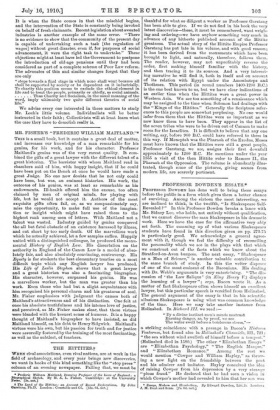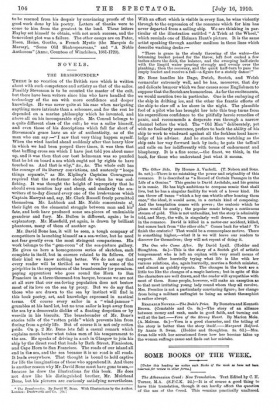PROFESSOR DOWDEN'S ESSA.YS.*
PROFESSOR DOWDEN has done well to bring these essays before the public in a form which gives them a better chance of surviving. Among the sixteen the most interesting, wo are inclined to think, is the twelfth, "Is Shakespeare Self- Revealed ? " In this Professor Dowden breaks a lance with Mr. Sidney Lee, who holds, not entirely without qualification, that we cannot discover the man Shakespeare in his dramatic work. Here we have the case for the affirmative very ably set forth. The summing up of what various Shakespeare students have found in this direction given on pp. 273-75 is particularly good. We acknowledge a general agree- ment with it, though we feel the difficulty of reconciling the personality which we see in the plays with that which we construct out of the facts which we know about the Stratford-on-Avon burgess. The next essay, " Shakespeare as a Man of Science," is another valuable contribution tc the same branch of study. In this the writer disposes of one of the most eminent of the Baconians. His dealing with Dr. Webb's arguments is very entertaining. " The dis- cussion of the Law Salique ' (in King Henry V.) displays the learning of a lawyer " ; ergo, Bacon wrote it. As a matter of fact Shakespeare often shows himself an excellent lawyer, but this particular speech is versified from Holinsbed. The general argument of the essay is that in his scientific allusions Shakespeare is using what was common knowledge of the time. Here we may take another instance from Holinshed. In Richard III. we read :— "By a divine instinct men's minds mistrust Ensuing danger, as, by proof, we see
The water swell before a boisterous storm,"—
a striking coincidence with a passage in Bacon's Historsa Ventorum, but found also in Holinshed's Chronicle, III., 721 "the sea without wind swelleth of himself before a tempest." (Holinshed died in 1580.) The other " Elizabethan Essays " are "Elizabethan Psychology," " The English Masque," and " Elizabethan Romance." Among the rest we would mention " Cowper and William Hayley," as throw- ing a new light on the friendship between the poet and his admirer and imitator. Hayley conceived the idea of raising Cowper from his depression by a very strange "pious fraud." He declared that he had seen a vision in which Cowper's mother had revealed to him that her son was
* Essays, Modern and Elizabethan. By Edward Dowden, Litt.D. London; 3. M. Dent and Sons. [78. 6d. net.]
to be rescued from his despair by convincing proofs of the good work done by his poetry. Letters of thanks were to come to him from the greatest in the land. These letters Hayley set himself to obtain, with not much success, and the benevolent plot was a failure. The other essays are on Pater, Ibsen, Heine, Goethe, a French Mystic (the Marquis de Marsay), "Some Old Shakespeareans," and "A Noble Authoress" (Anne, Countess of Winchilsea, 1661-1720).







































 Previous page
Previous page